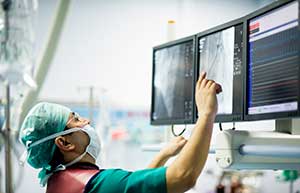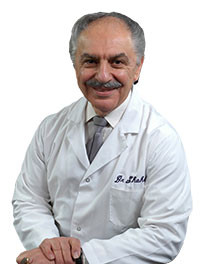Heart Transplant Surgery in Saddle River, NJ
What Is a Heart Transplant?

A heart transplant is a surgery that replaces a diseased or failing heart with a healthy donor heart. Although it may take years to secure a matching donor, heart replacement can be used to treat a number of serious, last-stage conditions, such as coronary artery disease. With the necessary lifestyle changes and immunosuppressant medications, a heart transplant can be very successful, with about 60 out of 100 recipients living 10 more years.
To schedule a consultation with a surgeon in Saddle River who specializes in heart transplant surgery, call (201) 806-6099 or contact Dr. M.T. Shahab online.
Who Needs a Heart Transplant?
Heart transplant surgery is typically only utilized when all other treatment options have been exhausted, and the heart is failing to pump blood to your body's organs. Cardiovascular conditions that can lead to such a degree of heart failure that may require a heart transplant include:
- Amyloidosis
- Cardiomyopathy
- Heart valve disease
- Congenital heart defect
- Coronary artery disease
- Pulmonary hypertension
- Idiopathic (cause unknown) congestive heart failure
You may be a good candidate for a heart transplant if you have a low VO2, which is a measure of the amount of oxygen that your body can utilize during intensive exercise. While most healthy adults may have a VO2 of about 35 mL/kg per minute, a possible candidate for heart transplant may have a VO2 of <14 mL/kg per minute.
Other factors for consideration include:
- Necessitating an artificial device to help the heart pump blood
- A history of repeated hospitalizations for heart failure
- Treatment history of increasing medication types and dosages
High medical costs and lack of available donor hearts may be limiting to patients seeking a heart transplant. Also, not everyone with heart failure is a good candidate for a heart transplant; potential recipients must have a very unhealthy heart but an otherwise healthy body. Certain conditions that may prevent a patient from receiving a heart transplant include:
- HIV
- Cancer
- Advanced age
- Active drug or alcohol addiction
- Cardiac cachexia (severe muscle loss due to malnutrition)
- Serious kidney, liver or lung disease that could shorten your life
- Pulmonary hypertension (further evaluation may be done by cardiologist to determine likelihood of transplant success)
If you suffer from any of these conditions or heart disease complications, talk to your healthcare provider, cardiologist, or surgeon; heart transplant may not be the best treatment for you.
Qualifying for Heart Surgery
Your healthcare provider will conduct a physical and mental examination to ensure you are a good candidate for a heart transplant procedure. You may be asked questions to determine whether or not you are willing and able to take the necessary steps to make your heart transplant a success. These questions may include whether or not you can emotionally handle the waiting period for a donated heart, and if you are willing to make the necessary lifestyle changes after the operation.
The examination may also require a number of other tests to determine the current state of your overall health. These tests can include:
- Skin testing for infections
- Cancer screenings
- Echocardiograms
- Perfusion tests
- Pulmonary function testing
If your healthcare provider decides that you are qualified to receive a heart transplant, they will put you on the National Organ Procurement and Transplantation Network's heart transplant list. Currently, there are about 3,000 individuals in the U.S. who are waiting for a heart transplant. During your waiting period, it may be recommended that you partake in cardiac rehabilitation and exercise and education program designed to help improve your health before and after your heart transplant. You may also have a mechanical pump called a ventricular assist device (VAD) implanted into your chest that moves blood from the lower chambers of your heart (ventricles) throughout your body. If the VAD does not provide enough relief from your condition, you may require an artificial heart.
What Can You Expect During the Procedure?
There are several factors that are taken into consideration when choosing a donor heart, including:
- Blood type
- Size of the donor
- How long the patient has been waiting
- The patient's disease and current state of health
- Antibodies the recipients may have developed
If the right donor is found, you will need to undergo the transplant surgery as soon as possible, usually within three hours of being notified.
The transplant is an open-heart surgery. Beforehand, you will be given a general anesthesia to make you sleep, and will then be connected to a heart-lung bypass machine to keep oxygen-rich blood flowing throughout your body. To remove your heart, an incision will be made in your chest, and your breastbone will be split in half to provide access to your heart. The heart surgeon removes the old heart, and the new heart is sewn to the major blood vessels. The surgeon will then shock the new heart with small paddles to re-start heartbeat.
Heart Transplant Recovery and Results
After the heart transplant, a ventilator machine will be used to help you breathe, and tubes will be inserted in your chest to drain fluids from around your lungs and heart. You will also receive fluids and medications through intravenous (IV) tubes inserted into the veins of your arms.
Although the length of your observation period can vary, you will usually be required to stay in the intensive care unit (ICU) for a few days and in the hospital for a week or two. During this time, you will be monitored by your healthcare team for any signs of rejection, such as shortness of breath, fever, fatigue, a lack of urination, or weight gain. After being released from the hospital, you will continue your cardiac rehabilitation program, as your heart rate will not be as quick as it used to be. You will also be instructed to take immunosuppressants for the rest of your life to prevent your body from rejecting the donor heart.
The success rate of a heart transplant is remarkably high. After a transplant, average one-year survival rates for patients with severe forms of heart failure are 85%-90% and average five-year survival rates are about 50%-60%. This is a clear improvement over the 80% first-year mortality rate of patients with severe heart failure. However, due to a transplant being an open-heart surgery, there are many potential complications of the operation, such as:
- Bleeding
- Infection
- Blood clots
- Heart attack
- In extreme cases, stroke or death
Additionally, risks of the operation can include:
- The immune system rejecting the donor heart
- Coronary arteries thickening, leading to cardiac allograft vasculopathy (CAV)
- Side effects of the immunosuppressants resulting in kidney damage, high blood pressure or osteoporosis
You will have frequent heart biopsies to monitor the changes within your heart and to make sure that these complications are not occurring. If they are, further treatment may be required.
Despite these potential risks, a heart replacement can save a life.
To learn more about heart replacement surgery or to become an organ donor in Saddle River, call (201) 806-6099 or contact Dr. M.T. Shahab online.
Medwell Orthopedics & Functional Medicine for Men & Women
Address
33 Central AveMidland Park, NJ 07432
(201) 806-6099
www.BergenCountyDoctors.com
Hours
Mon:
8:00 am - 8:00 pm
Tue:
2:00 pm - 7:00 pm
Wed:
8:00 am - 6:30 pm
Thu:
8:00 am - 1:00 pm
Fri:
8:00 am - 6:30 pm
Sat:
9:00 am - 1:00 pm
Sun:
By Appointment Only


